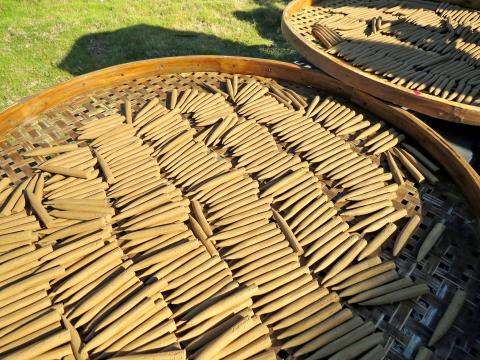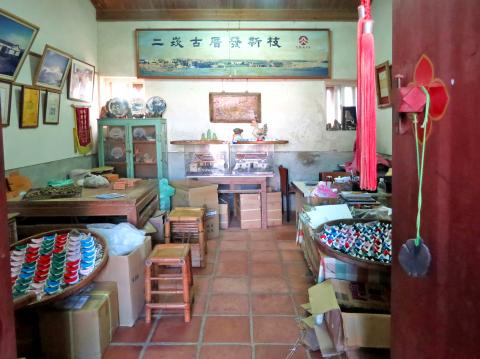Four years ago at his father’s request, Andrew Chen (陳怡碩) resigned from his job running a 7-Eleven in Greater Kaohsiung. Now he runs the family business, making sticks of mosquito-repelling incense out of his ancestral home in Erkan (二崁), Penghu County.
Erkan is located on Siyu (西嶼) islet of the Penghu archipelago. The village is remote and petite, home to about 70 people during the summer and 20 the rest of the year.
“It’s quiet out here,” Chen said. “I don’t really mind. I used to spend summers in Erkan as a boy and my memories were always fine.”

Photo: Enru Lin, Taipei Times
REPELLING ‘EVIL SPIRITS’ AND MOSQUITOES
Chen lives at the back end of the village for most days of the year. He sells sticks of Erkan Incense (二崁傳香) out of his home and more recently online.
These are amber-colored sticks that drive away “mosquitoes and evil spirits” when lit, Chen said.

Photo: Enru Lin, Taipei Times
The active ingredient is mugwort (艾草), a natural insect repellent native to Penghu County. The two other ingredients, firewheel (天人菊) and Hibiscus Taiwanensis (山芙蓉), release a warm and pleasant fragrance.
Chen and his staff harvest and dry the plants, then grind them into a fine powder. Water is added so that the powder becomes malleable and can be pressed into sticks.
After that, each batch is dried under the sun and packaged with a hand-molded clay incense holder in the shape of a boat. When the incense is mounted, its smoke looks like a tendril of steam curling from a ship into the sky.
Chen says his father created the concept and the incense recipe about 14 years ago.
“My father got this store started and then he got much busier and needed help. He asked if I would come, and I said yes,” he said.
GOING HOME
Chen, 41, grew up in Greater Kaohsiung, though his ancestors were some of Erkan’s earliest settlers.
His grandfather moved the family out of the village to find work. Like many young men of Erkan, he went to Taiwan proper to take an apprenticeship at a Chinese herbal medicine apothecary.
“A few Erkan youth needed to make a living and went to Taiwan to study herbal medicine. They opened stores, and over time they helped more people from Erkan go over and learn,” Chen said.
In 1994, Erkan was selected for government-funded preservation and some former villagers returned, mostly to participate in the Erkan Clan Preserve Association (二崁村聚落協進會).
Chen’s father, Chen Rong-yi (陳榮一), joined the association and was appointed chairman in 2000.
The Erkan Clan Preserve Association has been trying to boost tourism by developing the creative and cultural industries.
It converted a disused cowshed into an art gallery, filling it with sculptures made by residents. During the summer, Erkan’s one-room preschool sometimes offers lessons in praise song, a local musical tradition.
The low-rise Minnan-style homes, about 50 in total, are also open to visitors during the day. At the front door, residents hawk small wares such as ink stones, herbal teas and cold almond milk.
“He wanted to bring meaningful economic life to Erkan, but to make it truly special, too. A lot of Taiwan’s old streets thrive but have to sell many of the same things. He didn’t want Erkan to become another old street,” Chen said.
For information about the village, visit www.erkan.org.tw.

In the March 9 edition of the Taipei Times a piece by Ninon Godefroy ran with the headine “The quiet, gentle rhythm of Taiwan.” It started with the line “Taiwan is a small, humble place. There is no Eiffel Tower, no pyramids — no singular attraction that draws the world’s attention.” I laughed out loud at that. This was out of no disrespect for the author or the piece, which made some interesting analogies and good points about how both Din Tai Fung’s and Taiwan Semiconductor Manufacturing Co’s (TSMC, 台積電) meticulous attention to detail and quality are not quite up to

April 21 to April 27 Hsieh Er’s (謝娥) political fortunes were rising fast after she got out of jail and joined the Chinese Nationalist Party (KMT) in December 1945. Not only did she hold key positions in various committees, she was elected the only woman on the Taipei City Council and headed to Nanjing in 1946 as the sole Taiwanese female representative to the National Constituent Assembly. With the support of first lady Soong May-ling (宋美齡), she started the Taipei Women’s Association and Taiwan Provincial Women’s Association, where she

Chinese Nationalist Party (KMT) Chairman Eric Chu (朱立倫) hatched a bold plan to charge forward and seize the initiative when he held a protest in front of the Taipei City Prosecutors’ Office. Though risky, because illegal, its success would help tackle at least six problems facing both himself and the KMT. What he did not see coming was Taipei Mayor Chiang Wan-an (將萬安) tripping him up out of the gate. In spite of Chu being the most consequential and successful KMT chairman since the early 2010s — arguably saving the party from financial ruin and restoring its electoral viability —

It is one of the more remarkable facts of Taiwan history that it was never occupied or claimed by any of the numerous kingdoms of southern China — Han or otherwise — that lay just across the water from it. None of their brilliant ministers ever discovered that Taiwan was a “core interest” of the state whose annexation was “inevitable.” As Paul Kua notes in an excellent monograph laying out how the Portuguese gave Taiwan the name “Formosa,” the first Europeans to express an interest in occupying Taiwan were the Spanish. Tonio Andrade in his seminal work, How Taiwan Became Chinese,